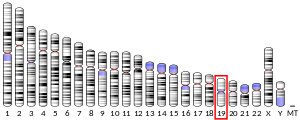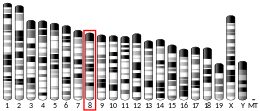GTPBP3
| GTPBP3 | |||||||||||||||||||||||||
|---|---|---|---|---|---|---|---|---|---|---|---|---|---|---|---|---|---|---|---|---|---|---|---|---|---|
| Identifiers | |||||||||||||||||||||||||
| Aliases | GTPBP3, GTPBG3, MSS1, MTGP1, THDF1, COXPD23, GTP binding protein 3 (mitochondrial), GTP binding protein 3, mitochondrial | ||||||||||||||||||||||||
| External IDs | MGI: 1917609 HomoloGene: 6600 GeneCards: GTPBP3 | ||||||||||||||||||||||||
| |||||||||||||||||||||||||
| |||||||||||||||||||||||||
| |||||||||||||||||||||||||
| |||||||||||||||||||||||||
| Orthologs | |||||||||||||||||||||||||
| Species | Human | Mouse | |||||||||||||||||||||||
| Entrez | |||||||||||||||||||||||||
| Ensembl | |||||||||||||||||||||||||
| UniProt | |||||||||||||||||||||||||
| RefSeq (mRNA) | |||||||||||||||||||||||||
| RefSeq (protein) | |||||||||||||||||||||||||
| Location (UCSC) | Chr 19: 17.33 – 17.34 Mb | Chr 8: 71.49 – 71.5 Mb | |||||||||||||||||||||||
| PubMed search | [3] | [4] | |||||||||||||||||||||||
| Wikidata | |||||||||||||||||||||||||
| |||||||||||||||||||||||||
tRNA modification GTPase GTPBP3, mitochondrial is an enzyme that in human is encoded by the GTPBP3 gene on chromosome 19.[5][6]
The GTPBP3 gene encodes a GTP-binding protein that is evolutionarily conserved from bacteria to mammals [7] and which is localized to the mitochondrion and functions in tRNA modification.[6] At least two major isoforms due to alternative splicing are known In addition, a polymorphism on valine 250 is known and may influence aminoglydoside-induced deafness.[6]
Structure
The GTPBP3 gene contains 10 exons,[6] and encodes a ~44 kDa GTP-binding protein that is evolutionarily conserved from bacteria to mammals.[7] The N-terminal domain of mitochondrial tRNA modification GTPase mediates the dimerization of the protein in a potassium-independent manner,[8] which is thought to be related to the construction of the binding site for the one-carbon-unit donor in its tRNA modification reaction function.[8]
Function
Mitochondrial tRNA modification GTPase is thought to catalyze the formation of 5-taurinomethyluridine (τm(5)U) in the anticodon wobble position of five mitochondrial tRNA.[9] The gene was first discovered yeast where the mutation of the yeast homolog of human GTPBP3, MSS1, is found to elicit respiratory defect in yeast only when the mitochondrial 155 rRNA P(R)454 is present. The latter is equivalent to the human 12 rRNA A1555G mutation which has been found to associate with deafness. Hence GTPBP3 and its yeast homolog function in modification of mitochondrial function. In human, GTPBP3 is ubiquitously expressed in multiple tissues in multiple transcripts.[7] As a tRNA modification enzyme, it is thought to function to modify codon-anticodon interaction, which is consistent with its modification of the severity of phenotypes in 12S rRNA A1555G mutation..
Clinical Significance
Mutations in GTPBP3 are known to cause hypertrophic cardiomyopathy and mitochondrial defects.[9] Individuals with homozygous or compound heterozygous mutations in GTPBP3 present with combined deficiency of respiratory chain complexes in skeletal muscle,[9] which require mitochondrial translation of mitochondrial-encoded complex subunits to assemble. GTPBP3 mutations cause severe mitochondrial translation defect. The majority of characterized subjects presented with lactic acidosis and hypertrophic cardiomyopathy.
The valine 250 polymorphisms on GTPBP3 is associated with severity of aminoglycoside-induced deafness in human, a disease associated with homoplasmic A1555G mutation in the mitochondrial-encoded 12S rRNA and is characterized by deafness, varying from profond congenital hearing loss to normal hearing.
References
- 1 2 3 GRCh38: Ensembl release 89: ENSG00000130299 - Ensembl, May 2017
- 1 2 3 GRCm38: Ensembl release 89: ENSMUSG00000007610 - Ensembl, May 2017
- ↑ "Human PubMed Reference:".
- ↑ "Mouse PubMed Reference:".
- ↑ Magrini SM, Papi MG, Marletta F, Tomaselli S, Cellai E, Mungai V, Biti G (Apr 1993). "Chordoma-natural history, treatment and prognosis. The Florence Radiotherapy Department experience (1956-1990) and a critical review of the literature". Acta Oncologica. 31 (8): 847–51. doi:10.3109/02841869209089717. PMID 1290633.
- 1 2 3 4 "Entrez Gene: GTPBP3 GTP binding protein 3 (mitochondrial)".
- 1 2 3 Li X, Guan MX (2002). "A human mitochondrial GTP binding protein related to tRNA modification may modulate phenotypic expression of the deafness-associated mitochondrial 12S rRNA mutation". Mol. Cell. Biol. 22 (21): 7701–11. doi:10.1128/mcb.22.21.7701-7711.2002. PMC 135671. PMID 12370316.
- 1 2 Villarroya M, Prado S, Esteve JM, Soriano MA, Aguado C, Pérez-Martínez D, Martínez-Ferrandis JI, Yim L, Victor VM, Cebolla E, Montaner A, Knecht E, Armengod ME (2008). "Characterization of human GTPBP3, a GTP-binding protein involved in mitochondrial tRNA modification". Mol. Cell. Biol. 28 (24): 7514–31. doi:10.1128/MCB.00946-08. PMC 2593442. PMID 18852288.
- 1 2 3 Kopajtich R, Nicholls TJ, Rorbach J, Metodiev MD, Freisinger P, Mandel H, Vanlander A, Ghezzi D, Carrozzo R, Taylor RW, Marquard K, Murayama K, Wieland T, Schwarzmayr T, Mayr JA, Pearce SF, Powell CA, Saada A, Ohtake A, Invernizzi F, Lamantea E, Sommerville EW, Pyle A, Chinnery PF, Crushell E, Okazaki Y, Kohda M, Kishita Y, Tokuzawa Y, Assouline Z, Rio M, Feillet F, Mousson de Camaret B, Chretien D, Munnich A, Menten B, Sante T, Smet J, Régal L, Lorber A, Khoury A, Zeviani M, Strom TM, Meitinger T, Bertini ES, Van Coster R, Klopstock T, Rötig A, Haack TB, Minczuk M, Prokisch H (2014). "Mutations in GTPBP3 cause a mitochondrial translation defect associated with hypertrophic cardiomyopathy, lactic acidosis, and encephalopathy". Am. J. Hum. Genet. 95 (6): 708–20. doi:10.1016/j.ajhg.2014.10.017. PMC 4259976. PMID 25434004.
Further reading
- Li X, Guan MX (Nov 2002). "A human mitochondrial GTP binding protein related to tRNA modification may modulate phenotypic expression of the deafness-associated mitochondrial 12S rRNA mutation". Molecular and Cellular Biology. 22 (21): 7701–11. doi:10.1128/MCB.22.21.7701-7711.2002. PMC 135671. PMID 12370316.
- Li X, Guan MX (Dec 2003). "Identification and characterization of mouse GTPBP3 gene encoding a mitochondrial GTP-binding protein involved in tRNA modification". Biochemical and Biophysical Research Communications. 312 (3): 747–54. doi:10.1016/j.bbrc.2003.10.187. PMID 14680828.
- Bykhovskaya Y, Mengesha E, Wang D, Yang H, Estivill X, Shohat M, Fischel-Ghodsian N (Nov 2004). "Phenotype of non-syndromic deafness associated with the mitochondrial A1555G mutation is modulated by mitochondrial RNA modifying enzymes MTO1 and GTPBP3". Molecular Genetics and Metabolism. 83 (3): 199–206. doi:10.1016/j.ymgme.2004.07.009. PMID 15542390.
- Rual JF, Venkatesan K, Hao T, Hirozane-Kishikawa T, Dricot A, Li N, Berriz GF, Gibbons FD, Dreze M, Ayivi-Guedehoussou N, Klitgord N, Simon C, Boxem M, Milstein S, Rosenberg J, Goldberg DS, Zhang LV, Wong SL, Franklin G, Li S, Albala JS, Lim J, Fraughton C, Llamosas E, Cevik S, Bex C, Lamesch P, Sikorski RS, Vandenhaute J, Zoghbi HY, Smolyar A, Bosak S, Sequerra R, Doucette-Stamm L, Cusick ME, Hill DE, Roth FP, Vidal M (Oct 2005). "Towards a proteome-scale map of the human protein-protein interaction network". Nature. 437 (7062): 1173–8. doi:10.1038/nature04209. PMID 16189514.
- Lim J, Hao T, Shaw C, Patel AJ, Szabó G, Rual JF, Fisk CJ, Li N, Smolyar A, Hill DE, Barabási AL, Vidal M, Zoghbi HY (May 2006). "A protein-protein interaction network for human inherited ataxias and disorders of Purkinje cell degeneration". Cell. 125 (4): 801–14. doi:10.1016/j.cell.2006.03.032. PMID 16713569.




